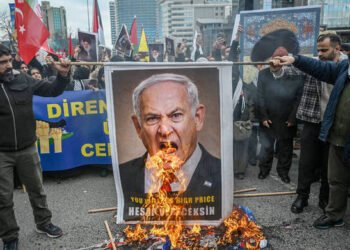Mustafa A. sentenced to 12 years in prison for torture and crimes against humanity
A pro-regime fighter in Syria’s civil war has been found guilty of torturing prisoners and sentenced to jail by a Dutch court.
Prosecutors said Mustafa A. was to blame for two civilians being dragged from their homes and violently tortured in Syria in 2013.
Dutch investigators described Mustafa A. as a “loyal ally” of President Bashar Al Assad’s regime who left Syria for the Netherlands in 2019.
Mustafa A. admitted being part of a pro-government militia called Liwa al-Quds that allegedly had close ties to Syrian intelligence.
He denied involvement in war crimes but was convicted by a court in The Hague and sentenced to 12 years in prison. Prosecutors had sought a 17-year term.
It is the first Dutch war crimes case involving an ally of Syria’s regime, after earlier proceedings were brought against ISIS supporters or other militants.
They are brought under a “universal jurisdiction” that means people can be prosecuted outside Syria if the suspect is in the Netherlands or a Dutch citizen was involved.
Mustafa A. successfully claimed asylum upon arriving in the Netherlands in 2019.
However, he was arrested in May 2022 after Dutch police were tipped off about his links to the militia, which grew out of a Palestinian refugee camp near Aleppo.
Dutch authorities said he was involved when a civilian was arrested in January 2013 and detained by Syrian air force intelligence.
Prosecutors said they were “convinced that he knew from his position” that people captured would be tortured in custody.
A second victim was jailed and tortured around the same time, the court heard, with one left in a coma and another unable to walk for a year.
Mustafa A. declined to answer questions in court but prosecutors said there was “ample evidence” of his guilt.
They said detectives had tapped his phone and found pictures that showed him in the company of Liwa al-Quds commanders.
The militia “played an important role for the regime, by keeping the civilian population under control and the regime in power”, prosecutors said.
Mustafa A. was “not some inconspicuous follower” of the militia but “took up a management position within the organisation”, they said.









 United Arab Emirates Dirham Exchange Rate
United Arab Emirates Dirham Exchange Rate

